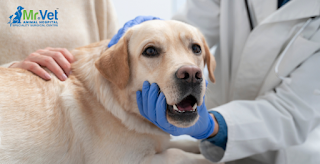Why Is My Dog Constantly Itching? A Guide to Understanding Skin Allergies in Dogs
 |
| Skin Allergies in Dogs |
Watching your dog scratch, bite, or lick themselves constantly can be distressing. Persistent itching often indicates underlying issues, such as skin allergies. This guide will help you understand why your dog might be experiencing itchy skin, the types of allergies that may be to blame, and what you can do to help relieve their discomfort.
Common Causes of Itching in Dogs
If your dog is scratching excessively, there's likely a specific reason. Here are some of the most common causes of skin allergies in dogs:
Flea Allergies
Fleas are a major cause of itchiness in dogs. For some dogs, even one flea bite can trigger an allergic reaction to the flea’s saliva, leading to flea allergy dermatitis. This reaction causes intense scratching and often results in red, irritated skin, especially around the tail, belly, and thighs.
Food Allergies
Dogs can also be allergic to certain ingredients in their diet. Common allergens include proteins like beef, chicken, and dairy. When a dog is allergic to a food, it can cause skin irritation, itching, and sometimes digestive issues. If you notice your dog’s symptoms worsen after eating certain foods, it may be worth considering a food allergy as the cause.
Environmental Allergies
Environmental factors, such as pollen, mold, or dust mites, can trigger skin allergies in dogs, similar to hay fever in humans. These allergies are often seasonal, with symptoms like itching and skin irritation usually affecting the paws, face, and ears.
Contact Dermatitis
Some dogs develop an allergic reaction when they come into contact with certain substances, such as cleaning products, certain plants, or specific types of grass. Known as contact dermatitis, this type of allergy can lead to red, itchy patches on the skin in areas that come into direct contact with the allergen.
Atopic Dermatitis
Atopic dermatitis is a genetic condition common in many breeds. This chronic, inflammatory skin disease is often triggered by environmental factors and can be worsened by stress or hormonal changes. Dogs with atopic dermatitis typically experience itching in areas like the belly, underarms, and ears.
Signs and Symptoms of Skin Allergies in Dogs
Recognizing the symptoms of skin allergies early can help you address the issue before it worsens. Common symptoms of skin allergies in dogs include:
- Persistent scratching, licking, or biting
- Red, inflamed skin or rashes
- Hair loss in irritated areas
- Bumps, scabs, or flaky patches on the skin
- Ear infections, often seen with head shaking or scratching at the ears
If you observe any of these symptoms in your dog, consult your veterinarian for an accurate diagnosis and treatment plan.
Diagnosing Skin Allergies in Dogs
Determining the cause of skin allergies requires a thorough assessment by a veterinarian. Here are some common diagnostic methods:
Flea Checks
Vets often start by ruling out fleas, as they are a leading cause of skin irritation. If fleas are present, treating the infestation often resolves the symptoms.
Elimination Diet
If food allergies are suspected, a veterinarian may recommend an elimination diet. This involves removing common allergens from your dog’s diet and gradually reintroducing them to identify the culprit.
Allergy Testing
For suspected environmental allergies, your veterinarian may suggest allergy testing. Blood tests or skin tests can identify specific allergens, such as pollen or mold, to help tailor treatment.
Treatment and Relief for Dog Skin Allergies
Once the source of your dog’s itching is identified, a treatment plan can be developed. Here are some effective ways to provide relief for skin allergies:
Flea Prevention
Keeping your dog on a regular flea prevention routine is crucial. Options include spot-on treatments, oral medications, and flea collars. Be sure to treat all pets in the home to avoid reinfestation.
Dietary Changes
For food allergies, work with your veterinarian to create a hypoallergenic or limited-ingredient diet. This can alleviate symptoms and improve your dog’s overall well-being.
Medications
In cases of severe itching, your vet might prescribe antihistamines or corticosteroids. For chronic conditions like atopic dermatitis, medications such as Apoquel or Cytopoint can provide relief from persistent itching.
Topical Treatments
Shampoos, sprays, and ointments formulated for sensitive skin can help soothe irritation. Opt for products made specifically for dogs and avoid those with artificial fragrances that could further irritate their skin.
Immunotherapy
For dogs with chronic environmental allergies, immunotherapy may be a solution. This involves administering small doses of the allergen over time to help desensitize your dog’s immune response.
Preventing Skin Allergies in Dogs
While some allergies are unavoidable, there are steps you can take to reduce flare-ups:
- Regular Grooming: Bathing your dog with a gentle, hypoallergenic shampoo removes allergens from their coat and reduces irritation. Brush regularly to keep their skin and coat healthy.
- Healthy Diet: A balanced diet rich in omega-3 and omega-6 fatty acids supports skin health and minimizes inflammation.
- Clean Environment: Regularly clean your dog’s bedding, toys, and living area to reduce allergens like dust and pollen.
When to See a Veterinarian
If your dog’s itching persists despite at-home care, or if they develop additional symptoms like vomiting, lethargy, or recurring ear infections, it’s time to visit your veterinarian. Prolonged itching can lead to secondary infections that may require antibiotics or other treatments.
Conclusion
Constant itching is often a sign of skin allergies in dogs, with common causes including fleas, food, and environmental factors. Identifying the source and providing appropriate treatment can make a world of difference for your dog. With regular care and preventative measures, you can help your furry friend live a more comfortable, itch-free life


Comments
Post a Comment